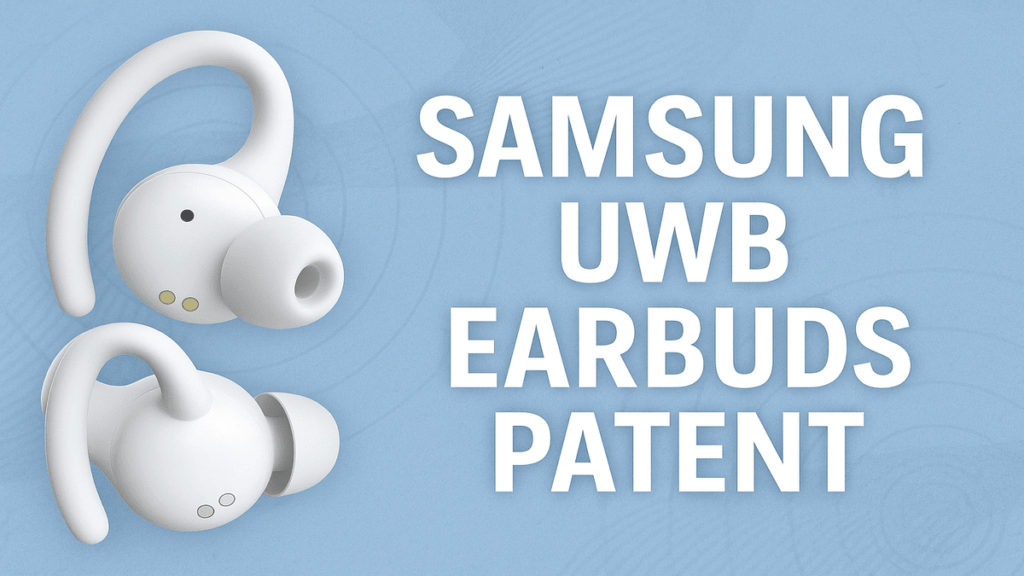Samsung is consistently at the forefront of innovation, and one of the latest developments creating buzz is its new patent for Samsung UWB (Ultra-Wideband) earbuds. This potential game-changer in the world of audio and wearable technology offers more than just superior sound quality. With the inclusion of UWB technology, Samsung is hinting at a future where earbuds will serve as intelligent, multifunctional devices, integrated deeply into the ecosystem of smart tech.
Let’s explore what the Samsung UWB earbuds patent could mean for consumers, and how this move might impact the way we interact with both audio gear and connected devices.
What is UWB and Why Does It Matter?
UWB (Ultra-Wideband) is a wireless communication protocol that allows devices to detect each other’s location with remarkable precision — sometimes down to centimeters. Unlike Bluetooth, which is more about data exchange over short ranges, UWB focuses on spatial awareness. This technology is already present in some smartphones and trackers.
When applied to earbuds, UWB could allow them to interact intelligently with nearby devices. For example:
- Automatically connect or switch to the closest paired device.
- Pause playback if the user removes one earbud or walks away from a certain location.
- Be used as a motion-based control device for other smart tech.
What Does the Samsung UWB Earbuds Patent Suggest?
Samsung’s patent — recently filed and publicly discussed by tech watchers — indicates a pair of wireless earbuds equipped with UWB sensors. The earbuds could interact with smartphones, TVs, tablets, and other IoT devices by tracking the user’s head movements and spatial orientation.
Some exciting potential applications include:
- Head gesture-based controls for calls, music, or smart home functions.
- Using earbuds as directional pointers to control connected TVs or smart displays.
- Enhanced location-based audio experiences, such as spatial audio aligned to the position of a screen or source.
This could open doors for immersive experiences in gaming, virtual meetings, augmented reality (AR), and more.
Impact on the Earbud Market
The earbud market is already competitive, with brands pushing boundaries in noise cancellation, battery life, and smart assistants. The integration of UWB could give Samsung a significant edge.
If brought to market, these UWB earbuds could challenge offerings from Apple, Sony, and Google, which currently dominate in audio innovation but haven’t yet deeply explored UWB in wearables.
Moreover, this technology could make Samsung’s earbuds a central hub in its Galaxy ecosystem — offering seamless and smart transitions between devices, improved security, and even Find My Earbuds functionality that’s far more accurate.
Privacy and Connectivity Concerns
As with any smart technology, concerns over data privacy and connectivity are likely. UWB enables tracking and location awareness, which, if mishandled, could pose risks to user privacy. However, Samsung has a strong history of implementing encryption and privacy controls in its devices.
The actual consumer model of these earbuds will likely include robust permissions for users to control how data is shared across devices.
When Will the Product Be Released?
As of now, the Samsung UWB earbuds patent is just that — a patent. This doesn’t guarantee an immediate product launch. However, given Samsung’s history of swiftly translating patents into reality, it’s reasonable to expect more concrete developments in the next 12–24 months.
Many analysts believe the UWB earbuds may debut alongside future Galaxy smartphones or in conjunction with smart home updates in the Samsung SmartThings ecosystem.
FAQs About Samsung UWB Earbuds Patent
Q1: What does the Samsung UWB earbuds patent cover?
A: The patent outlines wireless earbuds that incorporate Ultra-Wideband sensors to enable spatial awareness, motion tracking, and seamless device interaction within a smart ecosystem.
Q2: How are UWB earbuds different from regular Bluetooth earbuds?
A: UWB earbuds offer precise location tracking and can interact more intelligently with other devices, potentially allowing for gesture-based controls and accurate object positioning, unlike traditional Bluetooth earbuds.
Q3: Will these earbuds replace smart remotes or other devices?
A: Potentially. The patent suggests that the earbuds could be used to control TVs, AR devices, and smart displays via head gestures or direction-based controls, possibly replacing some basic remote functions.
Q4: Are there privacy risks with UWB-enabled earbuds?
A: UWB technology involves location tracking, so there’s a theoretical risk. However, Samsung is expected to implement privacy settings and encryption protocols to protect user data.
Q5: When will Samsung release these earbuds?
A: There is no official release date. Since it’s currently just a patent, product development and testing may take a year or more before any consumer version is introduced.
Conclusion
Samsung’s UWB earbuds patent showcases the brand’s ongoing commitment to innovation and smart connectivity. If these earbuds become a reality, they could reshape how users interact with wearable tech, offering immersive, intuitive, and spatially aware audio experiences.
While we’re still waiting for official confirmation and a launch date, the Samsung UWB earbuds have already captured the interest of tech enthusiasts and professionals eager to see what’s next in the evolution of personal audio devices.







